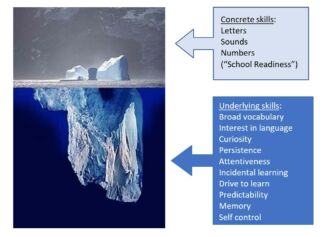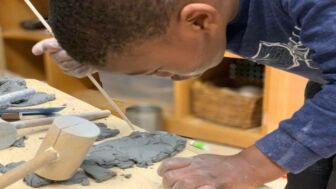At the annual NAEYC meeting in DC, DEY held our first Research into Practice Session with Dr. Dale Farran from Vanderbilt University, and Kisha Reid, DEY Director of Communication and Outreach. We conceptualized these Research into Practice Sessions as an opportunity to highlight research findings that are important to our work as early childhood advocates and demonstrate how the findings can influence our work as early childhood educators and caregivers. Dale Farran was part of the team of researchers to conduct the first longitudinal randomized controlled study of state-funded preschools in Tennessee. If you are unfamiliar with the study, you can read her blog here and the published research findings here.
The main takeaway is that the gains made by children who attended academic preschool were erased by kindergarten.
By the end of sixth grade, “children who attended pre-K scored significantly lower on Reading, Math, and Science state achievement tests than non-attenders. Children who attended pre-K were significantly more likely to be suspended or expelled, more often had an IEP, and had similar grade retention as non-attenders.”
From D. Farran’s presentation at NAEYC annual meeting in Washington, DC.
These findings might seem shocking given the widespread assumption that early academic training is what low-income children need to do well in school. But those of us who understand child development were not surprised to learn that pushing down academics onto younger children would not lead to meaningful long-term gains. As Dale explains in her blog and presentation, academic preschools focus on school readiness concrete skills such as letters, sounds, and numbers. However, it’s the underlying skills like interest in language, curiosity, independence, and drive to learn that support learning throughout schools. State-funded academic preschool programs emphasize teaching concrete skills and eliminating experiences that foster underlying skills. Dale argues that economically secure families and strong preschool programs provide children with experiences that foster underlying skills and support deeper learning. But like most states, Tennessee is giving low-income children an overdose of early academics that, over time, do more harm than good.

So what do these findings mean for our practice as advocates, teachers, and caregivers? Kisha shared how her understanding of child development and belief in the capabilities of young children guided her to build a program that allows children to experience a plethora of underlying skills. Free from the constraints of believing that early academics are needed in preschool, the children at Discovery Early Learning Center spend their formative years exploring, inquiring, constructing, designing, painting, sorting, building, jumping, collaborating, singing, and most importantly, being free to develop naturally.
“A place for childhood allows time for the process of learning to take its course. It understands that each child has their own path, timetable, and interests. It meets each individual child where they are and provides for their unique needs. A place for childhood is flexible.”
From K. Reid’s presentation at NAEYC annual meeting in Washington, DC.
We need more places for childhood that align with what we know about child development and resist harmful narratives that turn preschool into an early academic setting.


Our collaborative efforts to deliver DEY’s first Research into Practice Session led to the launch of DEY’s first national campaign. As advocates for a just and equitable early childhood for all children, we are using these findings to advocate for restoring the link between high quality and child development. We want to support you in resisting developmentally inappropriate demands from those who do not understand how children develop, demands that jeopardize the ability of our children to experience true early childhood education and care. Our In Defense of Early Childhood Education and Care Campaign will include the following:
- A sign-on statement that briefly outlines the issue and what we are fighting for.
- Mini-videos with supporters discussing the campaign and strategies for change.
- One-page fact sheets for advocating.
- Space and tools for networking regionally.
- Templates for writing letters to elected officials and op-eds.
- DEY Virtual Town Halls.
- Social media content and resource materials.
To learn more about the campaign and join our efforts, visit our DEY Advocacy Campaigns webpage. We also want to hear from you about your experience with this issue. What have you been asked to do that contradicts what you know about optimal child development? What do you want to do with young children but are not allowed to or do not have time to do? What policies interfere with doing what is right for young children? How do you resist? Who can we work with within your community to change things? You can provide your feedback here.
We look forward to working with you in 2023 in defense of early childhood education and care!
Have you heard our latest episode of the DEY podcast hosted by Lakisha Reid?
Have you seen our Advocacy Map? If you know of an early childhood advocacy organization or legislation, please submit it today.
Do you need funding to engage in community action? Apply for a DEY Mini-Grant.
Are you concerned about the direction that education policy is going? Please consider donating to support DEY’s important work advocating for appropriate education for young children.
Denisha Jones, Ph.D., J.D. is the Executive Director of Defending the Early Years and a part-time faculty in the Art of Teaching program at Sarah Lawrence College and the School of Education at Howard University.
